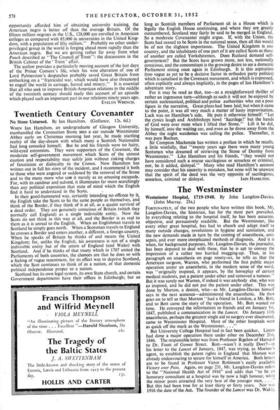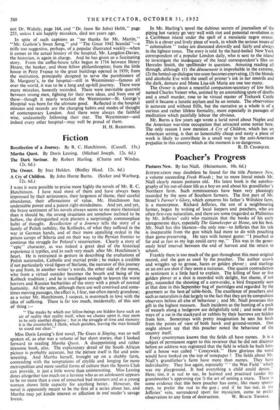The Westminster
Westminster Hospital, 1719-1948. By John Langdon-Davies. (John Murray. 21s.) FORTUNATELY, of the two people who have written this book, Mr, Langdon-Davies, the historian, has for the most part prevailed. In everything relating to the hospital itself, he has been accurate. objective, and persuasively readable. But the Westminster, like every other great hospital, has had to absorb and adapt itself to many outside changes, revolutions in hygiene and sanitation, and the new demands made in turn by the coming of anaesthesia, anti- sepsis, and ever more complicated methods of diagnosis. And it is when, for background purposes, Mr. Langdon-Davies, the journalist, has been deputed to deal with these, that he is apt to convey the impression of a rather too hurried mugging-up. Thus, in his paragraph on anaesthesia on page ninety-six, he tells us that the American surgeon, Warren, who performed the first public major operation under an anaesthetic, in the modern sense of the word, was "originally inspired, it appears, by the horseplay of certain medical students, put a patient under ether and removed a tumour." But it was surely not Warren, if indeed it was'anybody else, who was so inspired, and he did not put the patient under ether. This was done by Morton, a dentist, who—as Mr. Langdon-Davies himself says in the next sentence—administered the anaesthetic. He then goes on to ttll us that Morton "had a friend in London, a Mr. Bott, and to Bott came the story of the operation. Mr. Bott wasted no time. He conveyed the information to friends and on January 1st, 1847, published a communication in the Lancet. On January 11th anaesthesia, perhaps the greatest single aid to surgery ever discovered, came to Westminster Hospital. Most of the other hospitals were as quick off the mark as the Westminster. . . ."
But University College Hospital had in fact been quicker. Liston had done a major operation there under ether on December 21st, 1846. The responsible letter was from Professor Bigelow of Harvard to Dr. Foott of Gower Street. Bott—wasn't it really Dorr?—in his letter to the Lancet of January, 1847, was trying, as Morton's agent, to establish the patent rights in England that Morton was already endeavouring to secure for himself in America. Both letters are to be found in Professor Victor Robinson's easily available Victory over Pain. Again, on page 231. Mr. Langdon-Davies refers to the "National Health Act of 1916" and adds that "to be an honorary consultant at a hospital was by now a high honour, while the minor posts attracted the very best of the younger men. . . But this had been true for at least thirty or forty years. Nor was 1916 the date of the Act. The founder of the Lancet was Dr. Wakly,
not Dr. Wakely, page 164, and "Dr. (now Sir John) Hebb," page 255, unless I am happily mistaken, died ten years ago.
In spite of such captions as "no thanks for Mr. Martin," "Mr. Guthrie's Swan Song," and "The Great 1942 Scandal"—a trifle too suggestive, perhaps, of a popular illustrated weekly—when it comes to the actual history of the hospital, Mr. Langdon-Davies, the historian, is again in charge. And he has given us a fascinating story. From the coffee-house talks begun in 1716 between Henry Hoare, the banker, and three fellow philanthropists; from the little house in Petty France to the great buildings opened in 1939; from the institution, principally designed to serve the parishioners of St. Margaret's, to the hospital—still in Westminster—famous all over the world, it was to be a long and up-hill journey. There were many mistakes, honestly recorded. There were inevitable quarrels between strong men, fighting for their own ideas, and from one of these—though it nearly wrecked the Westminster—St. George's Hospital was born for the ultimate good. Reflected in the hospital minutes and records are the changing habits and modes of thought of contemporary London. And there were always the faithful wise, undauntedly following their star. The Westminster—and indeed every other hospital—may well be proud of them.
H. H. BASHFORD.



































 Previous page
Previous page